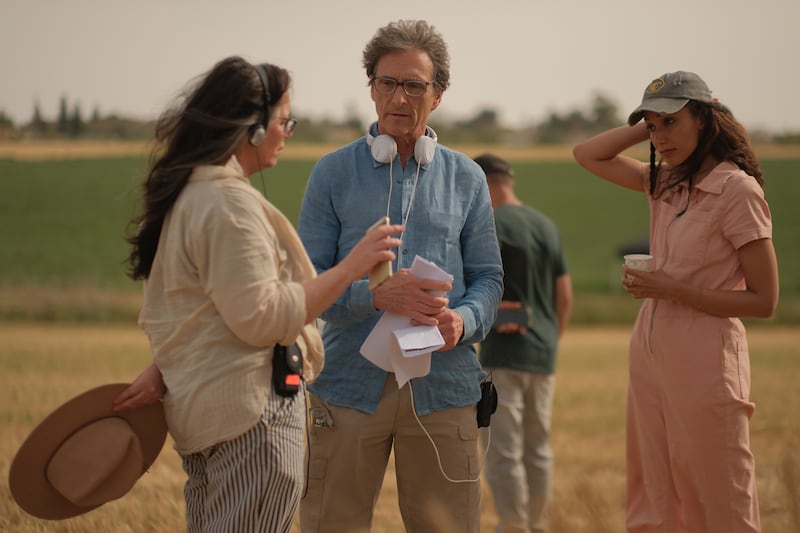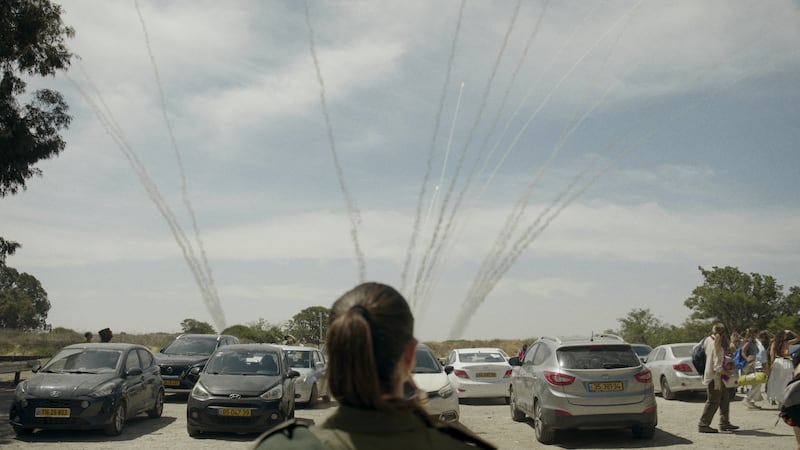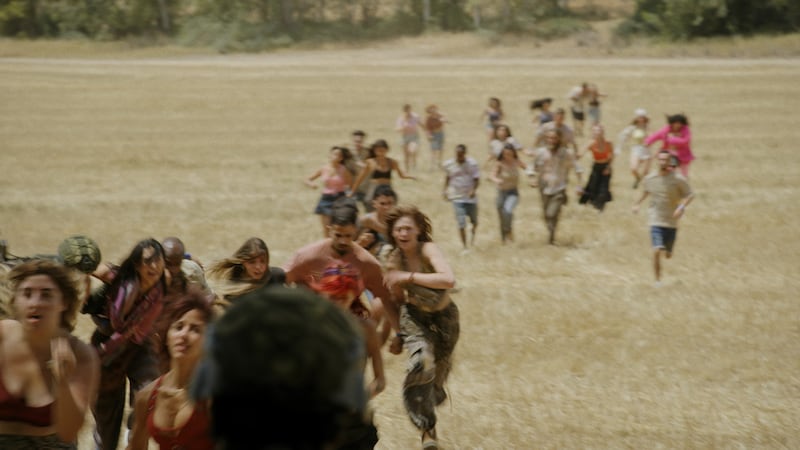Hours before delivering the final cut of Red Alert, executive producer Lawrence Bender studies shades of gray. The color of smoke billowing from fires in the distance of a scene must be just right.
Bender, who rose to Hollywood prominence producing Quentin Tarantino’s films, had pulled an all-nighter in his Holmby Hills house to finish the series. The deadline isn’t elastic; Red Alert streams on Paramount+ on October 7, the second anniversary of the Hamas attack on Israel.
Chatting over Zoom, Bender aims his phone at his monitor to introduce some of the crew in Israel as they make final color corrections. This four-part drama is scripted but not fictionalized. Actors portray real people’s verified accounts from that day.
On Oct.7, 2023, Hamas terrorists invaded Israel and killed 1,200 Jews, the most slaughtered in a single day since the Holocaust. Another 251 people were kidnapped. As of this writing, 48 hostages remain, and fewer than 20 are believed to be alive. A tentative peace agreement is in the works.
Red Alert is a passion project for Bender. He was stunned after the Hamas attack that no one reached out to check on him. He says his projects have always been inclusive. An example he cites is how, during the pandemic, activists for the Black Lives Matter movement lived with him and his son.
“And on October 7, where are all these people?” he asks rhetorically. “How come I wasn’t getting a phone call from every single one of these people? I felt alone. I felt somewhat betrayed, even by friends, people who are still my friends. In a kind of cultural way, I felt alone. And so, I decided it’s time. I need to now focus on my people and do something that’s going to help my tribe.”
Bender’s films, including Pulp Fiction and Inglourious Basterds, have garnered 36 Oscar nominations and eight wins. After screening Good Will Hunting at the White House and meeting President Clinton and others in government, Bender was motivated to make films, like An Inconvenient Truth, that pack social relevance.
Except for a brief epilogue showing the real people, the series, in Hebrew with English subtitles, is contained to October 7. Everyone on the Red Alert crew, save some producers, is Israeli and was there on that day.
Director, creator, and writer Lior Chefetz recalls that morning. He, his wife, and their toddler were planning to leave their apartment in Tel Aviv and spend the day with friends in the suburbs. When the first sirens blared at 6:29 am, he didn’t panic—as an Israeli, he’s no stranger to alerts. As the alarms intensified, he asked his friend if they could come over early. The kids played in a pool while adults stayed glued to the news.
Ironically, Chefetz had just spent two years creating a series about another attack on Israel, and that weekend, he was excited about it finally reaching TV.
“It’s called The Stronghold,” he says. “It’s a five-part limited series about the Yom Kippur War, a surprise attack that caught the entire Israeli nation completely unprepared, and about the brave young people who had to deal with those circumstances. We made it for the 50th anniversary, and it was supposed to be aired on October 8.”
Instead, everyone watched a new war unfold.

Those days were “really difficult times,” Chefetz says. “All the schools were canceled because rockets were raining down all the time, and they were afraid that it would be more; that there would be an invasion from Lebanon or from you don’t know where. All the kids were home, and it was like that for about two months, no schools, nothing, so you were just, like, sheltering at home.”
Chefetz served in the Army as a medic and knows what bloodshed looks like. That influences his work as a director. He understands there’s no need to document just how gruesome the scene was at the Nova Music Festival. He doesn’t show the bodies of people burned in their homes.
What Chefetz depicts is far more difficult to show than broken bodies. He reveals what people do when their next breath could be their last. The series allows viewers to feel the fear that thrummed through everyone.
The all-encompassing love parents have for children propels three of the stories.
There’s Tali (Sara Vino), the sort of woman you would have to be a colossal idiot to challenge. With her husband in synagogue, the family hears approaching gunfire, her son grabs his rifle and runs to help defend the community. The middle-aged mama runs after him.
She ignores the police who order her home. It’s practical advice; terrorists are firing from every direction. So? Tali is going to rescue her son, terrorists be damned. She’s determined to help whomever she can, and winds up driving like a stunt woman evacuating the wounded to medics because ambulances can’t get through the fighting.

Another warrior mom is Bat Sheva (Rotem Sela). As sirens blare, she, her husband, Ohad, and their three children took refuge in their house’s safe room on the rural Kibbutz Nir Oz. When the door wouldn’t lock properly, Ohad (Miki Leon) stood guard, armed.
Hamas shot the dad and kidnapped the family, separating them and forcing them onto motorcycles. Eitan, 12, was freed after 52 days in captivity. Ohad’s body was returned after 510 days. Bat Sheva and her daughters escaped after the terrorists lost control of the motorcycle in the chaos.
Bat Sheva, in socks and carrying the baby, and her 11-year-old daughter, barefoot, walked three miles through fields on the edge of the Negev Desert. Eventually, they espied the gray smoke of their burning kibbutz—the color Bender was perfecting.
The production looked for survivors, confirmed accounts, and gained people’s cooperation to accurately relay the worst day of their lives.
“The best way for me to tell you my story is I will stand in the places where it happened and I will tell you what happened,” Bat Sheva Yahalomi told director Chefetz.
They went to the family’s former home on the kibbutz in southern Israel, now abandoned except for a couple of 80-year-old farmers still plowing fields.
“It’s like an out-of-body experience to walk in there,” Chefetz says. “It’s a house of a family. You have toys, you have books, you have dishes on the kitchen table, and everything is riddled with bullets and with the marks of grenade explosions. It’s very weird. It’s incomprehensible.”
All of it is.
The series opens with a Palestinian Muslim man thrust into unimaginable danger. Ayub (Hisham Suleiman) lives in Israel with his wife and nine children. On the morning of October 7, he and his wife chat as she drives. Their baby is in the back seat when the car is ambushed, and the mom is killed. Ayub spends hours, terrified, trying to comfort a fussy baby with terrorists feet away.
One of the most haunting scenes has Ayub surrounded by IDF, ready to fire. He warns them of incoming terrorists. Trying to prove he’s not an enemy and lives in Israel, Ayub rummages through his pockets to show a letter from one daughter’s teacher—in Hebrew—and receipts from Israeli stores. The soldiers believe him. He helps save their lives, and they help him in return.
“We were looking for those people that are putting themselves at risk to help other people,” Chefetz says. “Sometimes it’s their family members, and many times it’s people they don’t know. They’re just helping strangers. So, we looked for stories that are really demonstrating those values.”
Working in Israel was different for Bender, whose films have taken him around the world. Creating the four-hour series in 39 days with one-third the crew and far less tech than usual was challenging, but doing so in Israel felt like a homecoming.
Making a series about the attack in a war zone while the war is ongoing was meta and surreal. Bender cites a scene where Bat Sheva and her daughters had to rest during their trek. They leaned against a tree as shots and rockets were heard.
“At the same time, you actually hear the war going on in the background,” Bender says. “And that juxtaposition is just an eerie thing.”

The production carted around portable concrete safe houses in case they were needed. They alerted everyone in the area about the production. Since it looks so real, Bender was worried that “they’re going to take their gun and they’re going to shoot the terrorist, who happens to be an actor. So, we had to be so careful. In one town, every 10 meters, we had a speaker announcing every 10 minutes, ‘We’re shooting a movie here. These are actors. These are not terrorists. ”
As several other documentaries and new series will be released marking the second anniversary of the attack, Bender explains what he hopes Red Alert will accomplish.
“I want people to understand, and if not, be reminded of, be confronted with, the reason why all this happened is this brutal group of people that are called Hamas are actually brutal terrorists,” he says.
“They’re horrific people that did these terrible things to the Israelis, and people need to know that these are brutal, terrible people that attacked innocent people that are just like us,” Bender continues. “And that was my son, not literally, but that was my son at the Nova festival. My son goes to music festivals. These are humans. One person is the universe, right? It’s important for people to understand that—that’s you, walking around one day, the next day, you’re being abducted.”
The post Making TV’s Most Harrowing Series—Where the Horrors Happened appeared first on The Daily Beast.




